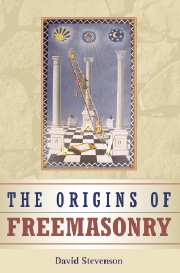Book contents
- Frontmatter
- Contents
- List of plates
- Preface
- List of abbreviations and conventions
- 1 Introduction
- 2 The Medieval contribution
- 3 William Schaw, master of works and general warden
- 4 The Sinelairs of Roslin and the masters of works
- 5 The Renaissance contribution
- 6 Rituals of identification and initiation
- 7 Sir Robert Moray: masonry, symbolism and ethics
- 8 The early Scottish lodges
- 9 Early Scottish and English freemasonry
- Appendix: Early (pre-1710) masonic lodges in Scotland
- Bibliographical note
- Index
- Plate section
4 - The Sinelairs of Roslin and the masters of works
Published online by Cambridge University Press: 06 July 2010
- Frontmatter
- Contents
- List of plates
- Preface
- List of abbreviations and conventions
- 1 Introduction
- 2 The Medieval contribution
- 3 William Schaw, master of works and general warden
- 4 The Sinelairs of Roslin and the masters of works
- 5 The Renaissance contribution
- 6 Rituals of identification and initiation
- 7 Sir Robert Moray: masonry, symbolism and ethics
- 8 The early Scottish lodges
- 9 Early Scottish and English freemasonry
- Appendix: Early (pre-1710) masonic lodges in Scotland
- Bibliographical note
- Index
- Plate section
Summary
The First St Clair Charter
The document generally known as the First St Clair Charter would more accurately be described as a letter or commission. It was issued in the name of the deacons, masters and freemen of the masons in Scotland, with the consent of William Schaw as master of works. From ‘aige to aige it hes bene observit amangs ws’, it is stated, that the lairds of Roslin ‘hes ever bene patrones and p[ro]tectors of ws and our previleges’, but within the past few years by negligence and slothfulness the office had passed out of use. This had deprived the lairds of their just rights, and the craft of their patrons, protectors and overseers, leading to many corruptions in the craft and to potential employers abandoning great ‘interpryses’ (building projects). Moreover, when controversies arose between masons it was very inconvenient that there was no patron or protector to judge such disputes, for masons could not use the ordinary courts of the country because of their poverty and because legal processes took so long before judgements were reached. Therefore the masons, with the consent of Schaw, had agreed that William Sinclair of Roslin and his heirs should obtain from the king jurisdiction over the masons as patrons and judges. Sinclair was to have power to appoint deputy judges under him, and his jurisdiction was to apply in burghs as well as in the countryside.
- Type
- Chapter
- Information
- The Origins of FreemasonryScotland's Century, 1590–1710, pp. 52 - 76Publisher: Cambridge University PressPrint publication year: 1988



